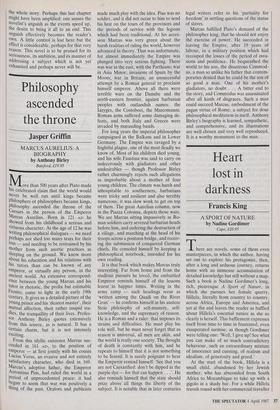Philosophy ascended the throne
Jasper Griffin
MARCUS AURELIUS: A BIOGRAPHY by Anthony Birley
Batsford, £19:95
More than 500 years after Plato made his celebrated claim that the world would never be well run until kings became philosphers or philosophers became kings, philosophy ascended the throne of the Caesars in the person of the Emperor Marcus Aurelius. Born in 121 AD he showed from his childhood a serious and virtuous character. At the age of 12 he was Writing philosophical dialogues — we need Perhaps not shed too many tears for their loss — and needing to be restrained by his mother from such ascetic practices as sleeping on the ground. We know more about his education and his relations with his tutors than can be known of any emperor, or virtually any person, in the ancient world. An extensive correspond- ence between the young Marcus and his tutor in rhetoric, the prolix but estimable Pronto, came to light in the early 19th century. It gives us a detailed picture of the young prince and his 'dearest master', their mutual affection, their rather insipid stu- dies, the tranquillity of their lives. Profes- sor Anthony Birley quotes extensively from this source, as is natural. It has a certain charm, but it is not intensely exciting. From this idyllic existence Marcus suc- ceeded in 161 AD, to the position of emperor — at first jointly with his cousin Lucius Verus, an evasive and not entirely satisfactory character, who died in 169. Marcus's adoptive father, the Emperor Antoninus Pius, had ruled the world in a Period of unprecedented peace: it had begun to seem that war was positively a thing of the past. Orators and publicists made much play with the idea. Pius was no soldier, and it did not occur to him to send his heir on the tours of the provinces and the periods of service with the legions which had been traditional. At his acces- sion Marcus was very green about the harsh realities of ruling the world, however advanced in theory. That was unfortunate, for almost immediately the Empire was plunged into very serious fighting. There was war in the east, with the Parthians; war in Asia Minor; invasions of Spain by the Moors; war in Britain; an unsuccessful attempt by a Roman general to proclaim himself emperor. Above all there were terrible wars on the Danube and the north-eastern frontier, against barbarian peoples with outlandish names: the Iazyges, the Costoboci, the Marcomanni. Roman arms suffered some damaging de- feats, and both Italy and Greece were invaded by marauding bands.
For long years the imperial philosopher campaigned in the Balkans and in Lower Germany. The Empire was ravaged by a frightful plague, one of the most deadly we know of. Most of his children died young, and his wife Faustina- was said to carry on indecorously with gladiators and other undesirables — though Professor Birley rather charmingly rejects such allegations as improbable about a mother of four young children. The climate was harsh and inhospitable to southerners, barbarians were tricky and resilient and also terribly numerous; it was slow work to get on top of them. The great Aurelian column, now in the Piazza Colonna, depicts those wars. We see Marcus sitting impassively as Ro- man soldiers carry severed barbarian heads before him, and ordering the destruction of a village, and marching at the head of his troops across a pontoon bridge, and receiv- ing the submission of conquered German chiefs. He consoled himself by keeping a philosophical notebook, intended for his own reading.
It is that book which makes Marcus truly interesting. Far from home and from the studious pursuits he loved, the embattled Emperor reminds himself of the lessons learnt in happier times. Writing in the army camp — such headings recur as `written among the Quadi on the River Gran' — he confirms himself in his austere Stoic philosophy of self-mastery, self- knowledge, and the supremacy of reason. He is a Roman and a ruler: that imposes its strains and difficulties. He must play his role well, but he must never forget that as reason is universal, all men are akin, and the world is really one society. The thought of death is constantly with him, and he repeats to himself that it is not something to be feared. It is surely poignant to hear the Emperor remind himself: 'See that you are not Caesarified: don't be dipped in the purple dye — for that can happen . . 1'. He also reminds himself that the state should prize above all things the liberty of the subject. It is notable that in later centuries legal writers refer to his 'partiality for freedom' in settling questions of the status of slaves.
Marcus fulfilled Plato's demand of the philosopher king, that he should not enjoy the exercise of power. He succeeded in leaving the Empire, after 19 years of labour, in a military position which had recouped the losses of the period of inva- sions and pestilence. He bequeathed the world to his son, the disastrous Commod- us, a man so unlike his father that contem- poraries denied that he could be the son of so good a man. One of his mother's gladiators, no doubt . . A bitter end to the story, and Commodus was assassinated after all kinds of disgraces. Such a man could succeed Marcus, embodiment of the pagan virtue of Rome: a subject for dour philosophical meditation in itself. Anthony Birley's biography is learned, sympathetic, and comprehensive, and its illustrations are well chosen and very well reproduced. It is a worthy monument to the man.


























































 Previous page
Previous page